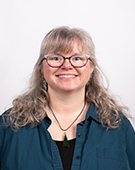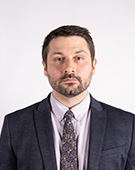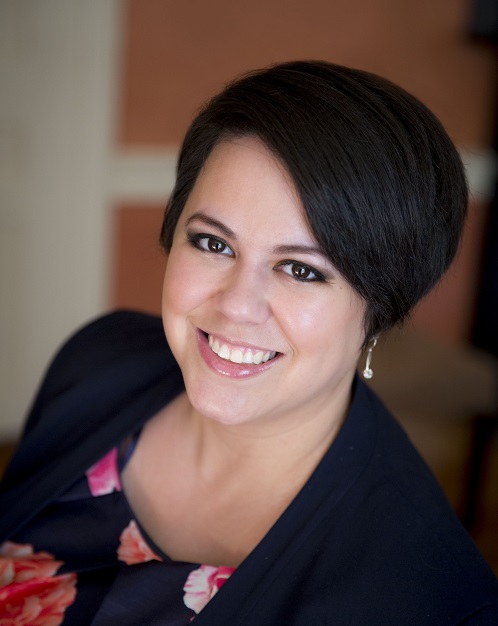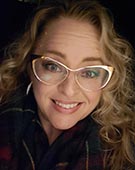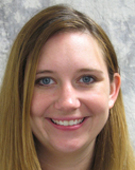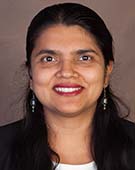
Speakers' Bureau
Northeastern State University is offering a pilot test of a Speakers' Bureau designed for high school teachers looking for a guest speaker to engage in their classroom. The bureau provides speakers at no cost to high schools in the local areas near our Tahlequah and Broken Arrow campuses. Speakers are available to discuss a wide range of topics, as detailed below. Feel free to peruse each speaker profile for individual bio information, available topics and academic credentials. To schedule a speaker, please reserve a time using the provided form below.
Learn More!
Below is a catalog of NSU faculty who are available as guest speakers in the region's high school classes. Class visits can be scheduled Feb. 1 - May 5. Visits are subject to faculty availability. Unless otherwise noted (or otherwise negotiated), speakers will expect to engage individual classes for 40-45 minutes, allowing time afterwards for a brief follow-up interaction.
All speaker requests must be made utilizing the form below. For additional questions, please contact the individual faculty member. Be sure to plan ahead as faculty availability will be limited. For best results, submit your speaker request at least two weeks in advance of your preferred date.
Tahlequah-Based Faculty
Dr. Athena Wooldridge | Assistant Professor of Marketing
3
Topic 1: Creating Consumer Trust & selling Super-Great, totally awesome (innovative)
ideas
Topic 2: The Future of Women in Consumerism
Learn more about Dr. Athena Wooldridge's presentation topics and how to reserve a time!
Presentation Topics
Topic 1: Creating Consumer Trust & selling Super-Great, totally awesome (innovative) ideas
This presentation focuses on the following questions for business entrepreneurs:
- How do you get the right innovation?
- What do you need to get the innovation right?
- When and What is the right marketing activation/marketing execution strategy?
- How do you build trust, create buzz, and make customers a fan?
- Why do consumers buy one product over another?
- How to be unique and think differently because differentiation wins.
Audio/Visual Needs: PowerPoint
Topic 2: The Future of Women in Consumerism
This presentation discusses the Power of Women in Consumerism. What influence do women have as local and national consumers and what role do women play in supporting and growing local businesses? Women have a varied and interesting role as influencers of product and brand development. This fun presentation explores the role of women as powerful consumers and their evolving role in the world of consumerism.
Audio/Visual Needs: PowerPoint
Dr. Athena Wooldridge completed her bachelor's degree at Southern Methodist University in Dallas, her Master's degree at Harvard University, and her Ph.D. at Oklahoma State University. Before joining NSU, Dr. Wooldridge worked for 10 years in the private sector for multinational manufacturers as well as international non-profit organizations where she focused on marketing strategy, profitability, and product development. Over the past decade, she has worked for national retail and restaurant organizations where she was responsible for consumer research, product development, procurement/supply chain, training, profitability, and strategy. Her current research focuses on sustainable behaviors of consumers and diversity, equity, and inclusion for recruitment marketing.
"Her current research focuses on sustainable behaviors of consumers and diversity, equity, and inclusion for recruitment marketing."
Dr. Christine Hallman | Professor of Geography
24
Topic 1: What cool things can you learn from tree rings?
Topic 2: Are seasons changing?
Topic 3: Do warrior women exist?
Learn more about Dr. Christine Hallman's presentation topics and how to reserve a time!
Presentation Topics
Topic 1: What cool things can you learn from tree rings?
Trees share unique stories through their rings. Scientists can learn how long a tree lived by counting rings, but by studying tree-ring widths, injuries, and their chemistry, trees reveal their secrets. Tree-rings tell us of climate history, streamflow, fall of civilizations, past fires and insect outbreaks, pollution, volcanic eruptions, floods, earthquakes, construction of buildings, shipwrecks, and much more. Trees can tell of their experiences related to environmental processes and events along with human interactions. In this presentation, we will explore how trees are sampled, how they are dated, and what we can learn from them.
*For this talk, I will bring tree-ring samples for students to examine.
Audio/Visual Needs: computer and projector (preferred)
Topic 2: Are seasons changing?
Humans studied seasonal changes in plants and animals (phenology) and the environment for millennia. Some of these seasonal events have been recorded on paper for hundreds of years. They include things like the blooming of cherry blossoms in Japan, migration of birds, and even the freezing and melting of waterways. By using historically recorded and recently collected data, scientists can investigate how our climate is changing and how it varied over time. In this presentation, we will investigate seasonal data from across the globe to determine if the climate we are experiencing today is different from our past climate.
Audio/Visual Needs: computer and projector required
Topic 3: Do warrior women exist?
Warrior women played incredible roles in past societies and continue to do so today. These warriors take many forms from those fighting on the battlefield to those advocating for a better world to fictional warriors and even to those warrior women walking among us. Many of these women are role models, doers, and inspirations for the next generation all the while paving the way for others and building a stronger community for each of us. How many warrior women have you heard of? Do you know any personally? In this presentation, we will explore what a warrior is and examples of warrior women across the globe.
Audio/Visual Needs: computer and projector required; access to internet preferred
Geography is a way for me to pursue my varied interests using a spatial lens incorporating both environmental and human aspects of our world in order to study our past and present. Geography is all about seeing connections, discovering relationships, and sharing stories. I earned a BS in Geology & Geography and MS in Geography from Murray State University in Kentucky. I earned a MS in Geosciences and PhD in Geography from the University of Arizona. My research includes water pollution, volcanic eruptions, tree-rings, climate change, warrior women, and pedagogy. I've always been interested in Earth systems and processes; how they work, how they are interconnected, and how humans impact them. This grew out of my experiences as a Kentucky farm girl where we were always outside - working. As an undergraduate, I wanted to learn about the complexities of rock formations and groundwater issues. Later in graduate school, I discovered tree-rings and the incredible stories they can tell us relating to climate change and natural hazards. At the same time, I participated in numerous outreach opportunities involving K-12, the university, and the general public. While collecting data for my PhD, I was even a park ranger/naturalist for the Ancient Bristlecone Pine Forest at Schulman Grove in California. This combination of earth science, geography, and teaching led me to my position at NSU as a professor where I still work on environmental issues but began developing an interest in learning and teaching about the impact of warrior women on our society.
Current research:
- Water quality on Illinois River
- Local women role models (focused on my home county in Kentucky)
Future research:
-
How does climate change affect seasonal changes (phenology) of trees in eastern Oklahoma
- Given 11 NSU coins by NSU students (as of 2022)
- Top 10 RiverHawk Recognition Recipient for faculty/staff leading in a positive manner and leaving a lasting impact on NSU students (2017 & 2022)
- Dr. Tiffany Maher Legacy Award (2020)
- NSU Circle of Excellence in Teaching (2014)
- College of Science Service Award, University of Arizona (2010)
- CATTS Fellowship - collaborations in local 3rd -12th grade classrooms, University of Arizona, funded by National Science Foundation (2007-2009)
- Hallman, C. 2017. Using packrat midden models to investigate climate variability. Science Scope. Vol 41:54-64.
- Lisenbee, P., Hallman, C., Landry, D. 2015. Geocaching is catching students attention in the classroom. The Geography Teacher. Vol 12 (1):7-16.
- Hallman, C., Arnott, H. 2015. Morphological and physiological phenology of ancient Pinus longaeva in the White Mountains of California. Tree-Ring Research. Vol 71 (1):1-12.
- Sheppard, P., Hallman, C., Ridenour, G., Witten, M. 2009. Spatial patterns of tungsten and cobalt on leaf surfaces of trees of Fallon, Nevada. Land Contamination & Reclamation. Vol 17(1): 31- 41.
- Sheppard, P., Hallman, C., Towner, R.H. 2008. Environmental history of the Southwest as general science education. Journal of Geoscience Education. Vol 55(3):212-219.
- Hallman, C.; S. Parkinson; R. Adams. 2006. LIMB: A Mini-Borer for Sampling Small Diameter Trees. Tree-Ring Research. Vol 62 (2):83-86.
- Hallman, C.; T. Harlan; H. Arnott. 2006. Lost and Found: The Bristlecone Pine Collection. Tree-Ring Research. Vol 62 (1):25-29.
- Arnott, H.; C. Hallman; T. Harlan; R. Adams. 2005. The -6413 Frost Ring is the Oldest in Bristlecone Pines. Texas Journal of Microscopy. Vol 36 (2):50-51.
- Arnott, H. and C. Hallman. 2002. An SEM Study of Frost Rings in a Bristlecone Pine (Pinus Longaeva) from Sheep Mountain, California. Texas Journal of Microscopy. Vol 33 (2) :42-43.
"Geography is a way for me to pursue my varied interests using a spatial lens incorporating both environmental and human aspects of our world in order to study our past and present. Geography is all about seeing connections, discovering relationships, and sharing stories."
Dr. Elaina Ross | Assistant Professor of Communication Studies
8
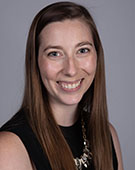 Presentation Topics:
Presentation Topics:
Topic 1: Reducing Public Speaking Anxiety
Topic 2: Successful Job Interviews
Topic 3: Maintaining Healthy Relationships
Learn more about Dr. Elaina Ross' presentation topics and how to reserve a time!
Presentation Topics
Topic 1: Reducing Public Speaking Anxiety
Many people face anxiety when asked to do public speaking. This presentation will engage students to work on practical, application-based tactics to reduce anxiety and prepare to speak in front of an audience. This will be useful to students regarding job interviews, end of the year speeches (like a graduation speech), general presentations, and special occasion speeches like a wedding toast.
Audio/Visual Needs: None
Topic 2: Successful Job Interviews
This presentation will focus on preparation for and interview techniques during job/college interviews. Students can bring resumes for feedback or we can discuss formatting/creating a resume. Students can also bring job descriptions to discuss how to nail the interview for that particular job.
Audio/Visual Needs: Projector/Computer
Topic 3: Maintaining Healthy Relationships
This presentation will discuss application-based tactics to maintain healthy interpersonal relationships and can focus on familial relationships, friendships, or romantic relationships. We will examine ways to communicate in a healthy way. Students are welcome to bring questions.
Audio/Visual Needs: None
Dr. Elaina Ross is an Assistant Professor of Communication Studies at Northeastern
State University. Dr. Ross graduated from Northeastern State University with her Bachelors
and Masters degrees, and from University of Kansas with her Doctoral degree in Communication
Studies.
Her research focuses on interpersonal and organizational communication. More specifically,
she is interested in how both work and family create identity. Currently, her research
has focused on maternity leave and breastfeeding support in the workplace through
both qualitative and quantitative social scientific research. Essentially, Dr. Ross
wants to know how people can successfully have both professional and personal lives
to the degree that they choose. Dr. Ross teaches a number of communication courses
at NSU, including interpersonal communication, family communication, public speaking,
business and professional communication, and interviewing.
Ross, E. M. & Woszidlo, A. (2022). Breastfeeding in the workplace: Attitudes toward multiple roles, perceptions of support, and workplace outcomes. Breastfeeding Medicine, 17(1), 38-45. https://doi.org/10.1089/bfm.2021.0119.
Ross, E. M. & Copeland, K. (2021). Sometimes I have to announce my feminism and I don't mind doing that: Instructor Self-Disclosure of Feminism in the Classroom. Feminist Pedagogy, 1(1). https://digitalcommons.calpoly.edu/feministpedagogy/vol1/iss1/5
Hall, J. A., Xing, C., Ross, E. M., & Johnson, R. M. (2021). Experimentally manipulating social media abstinence: Results of a four-week diary study. Media Psychology, 24(2), 259-275. doi:10.1080/15213269.2019.1688171
Ross, E. M., & Hall, J. A. (2020). The Traditional Sexual Script and Humor in Courtship. International Journal of Humor Research, 33(2). https://doi.org/10.1515/humor-2019-0017
"Her research focuses on interpersonal and organizational communication. More specifically, she is interested in how both work and family create identity."
Dr. Christopher Weaver | Associate Professor of Political Science
7
Presentation Topics
Topic 1: The Politics of Morality
Topic 2: Filling Pews and Voting Booths: The Role of Politicization in Congregational Growth
Topic 3: Five Stars, Would Elect Again: Polarization in Political Evaluations
Learn more about Dr. Christopher Weaver's presentation topics and how to reserve a time!
Presentation Topics
Topic 1: The Politics of Morality
This presentation will introduce students to the foundations of moral beliefs and their role in politics. Students will confront a variety of concepts and questions at the intersection of law, psychology, moral philosophy, and politics. We will explore the social and psychological roots of moral beliefs, the development and structure of collective value systems, and the various ways in which moral beliefs inform Americans' views on politics and policy-making. We will also examine the ways in which differences in moral beliefs divide American society today.
Audio/Visual Needs: Computer & Projector Screen
Topic 2: Filling Pews and Voting Booths: The Role of Politicization in Congregational Growth
Despite being seen by much of the world as a very religious country, religious affiliation in the US is in decline, with fewer Americans now likely to attend church. Some scholars argue that this is at least partially driven by the politicization of religion in the US. We will explore the politicization of American religion over time and its potential effect on religiosity, but we will also look at how some churches have successfully addressed declining attendance by becoming more politically active in order to attract congregants from the declining pool of the religious. While some may turn away from religion due to its politicization, those left behind may actually want more political activity and relevance from their faith. We will discuss how this phenomenon in the religious economy fits into broader trends in political science and the sociology of religion.
Audio/Visual Needs: Computer & Projector Screen
Topic 3: Five Stars, Would Elect Again: Polarization in Political Evaluations
As part of a lengthy process of polarization, American partisans have become both more extremely supportive of their candidates and more extremely opposed to their opponents. This rise in uncritical support for one's own side coupled with deep hostility for the opposing side poses a host of problems for American politics, which we will examine. However, this fits into a broader pattern of extremity in user/customer reviews: people seem to increasingly either love or hate the products and services they consume. We will look at how this extremity of responses in performance evaluations relates to similar evaluations of the president and Congress over time and across age cohorts, and we will explore the potential long-term consequences of this phenomenon for both politics and general society.
Audio/Visual Needs: Computer & Projector Screen
Dr. Christopher Weaver is an Associate Professor of Political Science at Northeastern State University in Oklahoma. His research and teaching focus on American political behavior, identity politics, and political inequality. He is particularly interested in how identity and belief affect political behavior and public opinion, especially among religious groups and marginalized groups. His work has been published in Political Research Quarterly, American Politics Research, Politics, Groups, and Identities, Law & Society Review, Politics and Religion, and the London School of Economics USAPP American politics and policy blog. He has also served on the editorial board for the journal Political Behavior and as a non-resident fellow at the Pulaski Institution. Christopher was born and raised in Arkansas, where he received a B.A. in politics from Hendrix College as a first-generation college student. He received his Ph.D. in political science from the University of Notre Dame in 2016 with concentrations in American politics and constitutional studies.
"Reconciling the God and Gender Gaps: The Influence of Women in Church Politics. Politics,
Groups, and Identities 6(4): 682-701 (with Andre Audette & Maryann Kwakwa)
Adapting Identities: Religious Conversion and Partisanship among Asian American Immigrants.
American Politics Research 45(4): 692-721 (with Andre Audette & Mark Brockway)
Filling Pews and Voting Booths: The Role of Politicization in Congregational Growth.
Political Research Quarterly 69(2): 245-257 (with Andre Audette)
Religion and Secularism among American Party Activists. Politics and Religion 9(2):
271-295 (with Geoffrey Layman)
Faith in the Court: Religious Out-Groups and the Perceived Legitimacy of Judicial
Decisions. Law & Society Review 49(4): 999-1022 (with Andre Audette)
Political and Spiritual Migration: The Adaptive Formation of Religious and Partisan
Attachments among Latino Immigrants in the United States. Politics and Religion 8(3):
488-513
"Dr. Christopher Weaver's research and teaching focus on American political behavior, identity politics, and political inequality."
Dr. Cammi Valdez | Assistant Professor of Chemistry
4
Presentation Topics
Topic 1: Fighting Blindness using Animal Models
Topic 2: 3D Printing in Science for Accessibility and Education
Topic 3: From Oklahoma to Harvard and Back!
Learn more about Dr. Cammi Valdez's presentation topics and how to reserve a time!
Presentation Topics
Topic 1. Fighting Blindness using Animal Models
Fun fact: animal research has increased the human lifespan by more than 27 years. My lab uses animal models of disease to better understand what is happening on the microscopic scale. We are interested in studying small vessel diseases, such as diabetic retinopathy (the eye disease in diabetes). To better characterize diabetic retinopathy, we use diabetic mouse models to try to tease out how the disease develops in hopes of finding new targets for drugs and treatment. While most people are aware of the complications that comes with diabetes, such as cardiovascular disease and limb amputation, most folks don't know it can also lead to blindness. So, our lab in fighting blindness using animal models!
Audio/Visual Needs: Projector & Screen
Topic 2. 3D Printing in Science for Accessibility and Education
Let's face it - 3D printing is cool! You can create completely novel designs in a short period, come up with a solution to nearly any household issue, or just make something interesting with 3D printing. In my lab, the 3D printer is used for functional needs in experiments and for creating accessible models for low vision and blind audiences. In my classroom, the 3D printer is used for creating kinesthetic (tangible touchable) models of complex chemical molecules to help students better understand their structures. 3D printing offers a world of new possibilities in the classroom!
Depending on time, this presentation can include design time for students to begin developing their own 3D creations.
Audio/Visual Needs: Computer Lab if opting for design time
Topic 3. From Oklahoma to Harvard and Back!
In this talk, I will share my journey growing up in Oklahoma, going to a regional college in Oklahoma, earning my Ph.D. at Harvard University, and then coming back to Oklahoma to teach at Northeastern State University. I grew up in Enid, OK, attending public school for K-12. I then went to Southwestern Oklahoma State University for my undergraduate degrees in Chemistry and Mathematics. Immediately after undergrad, I went to Harvard University for my Ph.D. in Biological Chemistry and Molecular Pharmacology. After my Ph.D. I spent 4 years running research programs at Harvard College and 2 years as the Director of the McNair Scholars Program at Wellesley College. While I Wellesley, I began my own research lab and started as a faculty member. When the pandemic hit, I knew I wanted to be closer to family and continue my journey as a faculty member, which is when I joined the faculty at Northeastern State University. This is a personal journey that illustrates that the path to success in non-linear.
Audio/Visual Needs: None; Projector and Screen could be used if available
Dr. Cammi Valdez is a vascular biologist, faculty member, and champion of making STEM accessible. As a Latina woman scientist, she is a strong advocate for empowering and advancing women, first generation students, and people of color in STEM. Dr. Valdez is currently an Assistant Professor of Chemistry at Northeastern State University. Beginning in 2015, she has served as a member of the Harvard Graduate School Alumni Council and in 2020 she became a trustee for the Southwestern Oklahoma State University Foundation. Previously, Dr. Valdez served as the Director of the McNair Scholars Program at Wellesley College and as Assistant Director of Research and Fellowships at Harvard College.
The Valdez Laboratory takes a four-pronged approached to studying Diabetic Retinopathy, the eye disease in diabetes: vascular research, tool developments, community needs, and STEM education. We are able to accomplish this through traditional lab benchwork with mouse models of disease, computational programming, and innovative approaches with 3D printing to connect with our community.
Dr. Valdez received a B.S. Professional in Chemistry and a B.S. in Mathematics from Southwestern Oklahoma State University, where she was an OK-LSAMP Scholar, and earned her PhD in Biological Chemistry and Molecular Pharmacology from Harvard University. During graduate school, her scholarship and work was recognized with the NSF Graduate Research Fellowship, NASPA Massachusetts Richard F. Stevens Outstanding Graduate Student Award, 60th Nobel Laureate Meeting Harvard Ambassador, and serving as a Harvard GSAS Commencement Marshal. Her research in vascular biology has been published in numerous journals including The American Journal of Pathology as well as Current Diabetes Report.
- 2022 Recipient of the Genentech Career Development Award for Underrepresented Minority Emerging Vision Scientists ($100,000)
- 2021 Tony Quinn National Inclusive Excellence Award Recipient
- OK-INBRE Research Project Investigator Award ($250,000)
- Harvard GSAS Commencement Marshal
- NASPA MA Outstanding Graduate Student Award
- NSF Graduate Research Fellowship Recipient
- 60th Nobel laureate Meeting Harvard Representative
- American Chemical Society Scholar
- NSF LSAMP Scholar
J.F. Arboleda-Velasquez, C.N. Valdez, C.K. Marko, P.A. D'Amore. 2015. From Pathobiology to the Targeting of Pericytes for the Treatment of Diabetic Retinopathy. Current Diabetes Report.
C.N. Valdez, J.F. Arboreda-Velasquez, D.S. Amarnani, L.A. Kim, and P.A. D'Amore. 2014. Retinal microangiopathy in a mouse model of inducible mural cell loss. American Journal of Pathology.
"Dr. Cammi Valdez is a vascular biologist, faculty member, and champion of making STEM accessible. As a Latina woman scientist, she is a strong advocate for empowering and advancing women, first generation students, and people of color in STEM."
Tahlequah-based faculty are available for the following high schools: |
||
| Hulbert High School Keys High School Sequoyah High School Tahlequah High School |
Boulevard Christian High School Braggs High School Fort Gibson High School Hilldale High School |
Muskogee High School Oktaha High School Warner High School Webbers Falls High School |
Broken Arrow-Based Faculty
Dr. Jericho Hobson | Associate Professor of Curriculum & Instruction/Teacher Education
10
Presentation Topics
Topic 1: STEAM Workshops
Topic 2: Positive Classroom Relationships
Topic 3: Trauma Informed & Responsive Education
Learn more about Dr. Jericho Hobson's presentation topics and how to reserve a time!
Presentation Topics
Topic 1: STEAM Workshops
Audio/Visual Needs: Computer & Projector
Topic 2: Positive Classroom Relationships
Audio/Visual Needs: Computer & Projector
Topic 2: Trauma Informed & Responsive Education
Audio/Visual Needs: Computer & Projector
Jericho Hobson has been an Oklahoma educator for eighteen years, eight of these years were spent teaching 4th-6th-grade students in two Tulsa Public Schools. In her most recent years, she has been in the Department of Curriculum and Instruction at Northeastern State University, where she is the current director for the TURN program, preparing future teachers for success in the urban classroom. She has an undergraduate degree in Pre-Med Biology, a Masters Degree in Instructional Leadership, and a Doctorate Degree in Curriculum Studies. She has also worked as a curriculum writer, Faculty Advisor for Teach for America, professional development presenter, and grade level team leader. She has been awarded Teacher of the Year at two elementary schools and received the Masonic Lodge Teacher of Today on two separate occasions, and most recently she was voted for by NSU students and awarded the Top 10 RiverHawk Award twice. She is passionate about life-long learning and establishing positive classroom relationships.
- Teacher of the Year at two elementary schools
- Masonic Lodge Teacher of Today on two separate occasions
- Voted for by NSU students and awarded the Top 10 RiverHawk Award twice
- Davinci OK Fellow 2021
"She is passionate about life-long learning and establishing positive classroom relationships."
Dr. Meagan Moreland | Professor of Curriculum & Instruction
15
Topic 1: What is Available through the College of Education
Topic 2: Why Teach? Benefits of Being an Educator
Topic 3: I am open to speak on all things education
Learn more about Dr. Meagan Moreland's presentation topics and how to reserve a time!
Presentation Topics
Topic 1: What is Available through the College of Education
In this presentation, I will talk about all the degrees offered by the College of Education. I will also share scholarship opportunities and how students can use these degrees.
Topic 2: Why Teach? Benefits of Being an Educator
This presentation explores the wonderful aspects of teaching. We will explore the benefits both intrinsic and extrinsic.
Topic 3: I am open to speak on all things education
Tell me your need and I can cultivate something.
As a young child, I was an avid reader. As the years continued I realized how fortunate I was to have developed a love of literacy at such a young age. My goals are to ensure educators have ample knowledge on teaching their students all of the stages of reading. My research has revolved around motivation and engagement of reading.
DaVinci Fellow, Dewberry Winner for Teaching, State Advisor of the year for SOEA.
"My goals are to ensure educators have ample knowledge on teaching their students all of the stages of reading."
Dr. Christopher Weaver | Associate Professor of Political Science
7
Presentation Topics
Topic 1: The Politics of Morality
Topic 2: Filling Pews and Voting Booths: The Role of Politicization in Congregational Growth
Topic 3: Five Stars, Would Elect Again: Polarization in Political Evaluations
Learn more about Dr. Christopher Weaver's presentation topics and how to reserve a time!
Presentation Topics
Topic 1: The Politics of Morality
This presentation will introduce students to the foundations of moral beliefs and their role in politics. Students will confront a variety of concepts and questions at the intersection of law, psychology, moral philosophy, and politics. We will explore the social and psychological roots of moral beliefs, the development and structure of collective value systems, and the various ways in which moral beliefs inform Americans' views on politics and policy-making. We will also examine the ways in which differences in moral beliefs divide American society today.
Audio/Visual Needs: Computer & Projector Screen
Topic 2: Filling Pews and Voting Booths: The Role of Politicization in Congregational Growth
Despite being seen by much of the world as a very religious country, religious affiliation in the US is in decline, with fewer Americans now likely to attend church. Some scholars argue that this is at least partially driven by the politicization of religion in the US. We will explore the politicization of American religion over time and its potential effect on religiosity, but we will also look at how some churches have successfully addressed declining attendance by becoming more politically active in order to attract congregants from the declining pool of the religious. While some may turn away from religion due to its politicization, those left behind may actually want more political activity and relevance from their faith. We will discuss how this phenomenon in the religious economy fits into broader trends in political science and the sociology of religion.
Audio/Visual Needs: Computer & Projector Screen
Topic 3: Five Stars, Would Elect Again: Polarization in Political Evaluations
As part of a lengthy process of polarization, American partisans have become both more extremely supportive of their candidates and more extremely opposed to their opponents. This rise in uncritical support for one's own side coupled with deep hostility for the opposing side poses a host of problems for American politics, which we will examine. However, this fits into a broader pattern of extremity in user/customer reviews: people seem to increasingly either love or hate the products and services they consume. We will look at how this extremity of responses in performance evaluations relates to similar evaluations of the president and Congress over time and across age cohorts, and we will explore the potential long-term consequences of this phenomenon for both politics and general society.
Audio/Visual Needs: Computer & Projector Screen
Dr. Christopher Weaver is an Associate Professor of Political Science at Northeastern State University in Oklahoma. His research and teaching focus on American political behavior, identity politics, and political inequality. He is particularly interested in how identity and belief affect political behavior and public opinion, especially among religious groups and marginalized groups. His work has been published in Political Research Quarterly, American Politics Research, Politics, Groups, and Identities, Law & Society Review, Politics and Religion, and the London School of Economics USAPP American politics and policy blog. He has also served on the editorial board for the journal Political Behavior and as a non-resident fellow at the Pulaski Institution. Christopher was born and raised in Arkansas, where he received a B.A. in politics from Hendrix College as a first-generation college student. He received his Ph.D. in political science from the University of Notre Dame in 2016 with concentrations in American politics and constitutional studies.
"Reconciling the God and Gender Gaps: The Influence of Women in Church Politics.”
Politics, Groups, and Identities 6(4): 682-701 (with Andre Audette & Maryann Kwakwa)
“Adapting Identities: Religious Conversion and Partisanship among Asian American Immigrants.”
American Politics Research 45(4): 692–721 (with Andre Audette & Mark Brockway)
“Filling Pews and Voting Booths: The Role of Politicization in Congregational Growth.”
Political Research Quarterly 69(2): 245–257 (with Andre Audette)
“Religion and Secularism among American Party Activists.” Politics and Religion 9(2):
271–295 (with Geoffrey Layman)
“Faith in the Court: Religious Out-Groups and the Perceived Legitimacy of Judicial
Decisions.” Law & Society Review 49(4): 999–1022 (with Andre Audette)
“Political and Spiritual Migration: The Adaptive Formation of Religious and Partisan
Attachments among Latino Immigrants in the United States.” Politics and Religion 8(3):
488–513
"Dr. Christopher Weaver's research and teaching focus on American political behavior, identity politics, and political inequality."
Dr. Sapna Das Bradoo | Professor of Biology
10
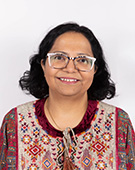 Presentation Topics
Presentation Topics
Topic 1: Human Cell Culture
Topic 2: Gene Editing and CRISPR
Topic 3: DNA Damage and Repair
Learn more about Dr. Sapna Das Bradoo's presentation topics and how to reserve a time!
Presentation Topics
Topic 1. Human Cell Culture
Cell culture refers to the removal of cells from an animal or plant and subsequent cultivation in an artificial environment for scientific research. The first cell culture techniques were developed over 100 years ago and since then have contributed to tremendous breakthroughs in science. Today, it is a fundamental tool used in laboratories around the world for studying the normal physiology and biochemistry of cells, mechanisms underlying disease, including cancer, and effects of drugs and toxic compounds.
Audio/Visual Needs: Projector/microscopes
Book This Speaker!
Topic 2. Gene Editing and CRISPR
Gene editing is a group of technologies that give scientists the ability to change an organism's DNA. These technologies allow genetic material to be added, removed, or altered at particular locations in the genome. Several approaches to genome editing have been developed. A well-known one is called CRISPR-Cas9, which is short for clustered regularly interspaced short palindromic repeats and CRISPR-associated protein 9. The CRISPR-Cas9 system has generated a lot of excitement in the scientific community because it is faster, cheaper, more accurate, and more efficient than other genome editing methods.
Audio/Visual Needs: Projector/microscopes
Book This Speaker!
Topic 3. DNA Damage and Repair
Cells constantly deal with damage to their DNA that can originate from endogenous processes, such as DNA replication stress, or exogenous exposures such as ionizing radiation and chemotherapy drugs. DNA damaging agents give rise to different types of DNA damage, and failure to repair the damage can result in a number of possible devastating consequences to the cell, including genetic instability and accumulation of mutations promoting tumorigenesis. Cells have therefore developed intricate repair mechanisms to deal with the different types of possible DNA lesions that arise; all with the goal of protecting genomic stability.
Audio/Visual Needs: Projector/microscopes
Book This Speaker!
I am committed to excellence in classroom teaching and the mentorship of undergraduate and master’s students in independent research projects. My teaching load at NSU includes upper-level Cell Biology, Molecular Biology, Virology, and Research in Biology courses. As a PI on several universities- and NIH-funded grants, I have established a vibrant, active, independent research lab investigating genomic DNA replication and damage response pathways.
I received my training in the field of DNA replication as a postdoctoral associate in Dr. Anja-Katrin Bielinsky’s group at the University of Minnesota. At that time, Mcm10 was an uncharacterized protein. I discovered that Mcm10 interacts with another essential replication protein, Proliferating Cell nuclear antigen (PCNA). Furthermore, these studies showed that Mcm10 and PCNA interaction was essential. These results were published in Molecular and Cellular Biology in 2006, and the article was selected by “Faculty of 1000”. The paper was rated “9.3” (out of 10) and scored as “exceptional”. With my second project, I gained experience on cell cycle checkpoints in budding yeast under both normal and DNA damage conditions. I uncovered a new pathway that is required to elicit a checkpoint during the S phase. Results of this project were published in Nature Cell Biology in 2010. These results have also been chosen for platform presentations at the Cold Spring Harbor and Keystone meetings on DNA replication.
My laboratory published an article in Nucleic Acids Research where we observed Mcm10’s role in resisting DNA damage through its interaction with the checkpoint clamp. This work was done by a graduate student and a laboratory assistant in my lab, and it was in collaboration with the University of Minnesota. Also, we deciphered the ubiquitination sites on Mcm10 using proteomic and biochemical approaches. This work was published in Biochemistry and Biophysics Reports in collaboration with the University of Minnesota. The current application builds on my prior work. Currently, we are proposing to study another replication protein, DNA polymerase epsilon (Pol e), and its role in genetic and epigenetic pathways especially in patients that carry mutated POLE1 and exhibit facial dysmorphism, immunodeficiency, livedo, and short stature (FILS syndrome).
I have engaged minority, first-generation college and high school students in research and experiential, inquiry-based learning. Most of these students were selected to present their work as a poster and oral presentations in conferences in Oklahoma and Arkansas. The one-to-one interaction with faculty and peers in a research environment helped their retention in classes, networking with other scientists in Oklahoma and supported their progress towards their professional goals.
- Received the NSU faculty mentor award of the year (2021-2022).
- Nominated for the 2021 Council of Undergraduate Research Biology Division Faculty Mentor Award.
- Awarded DaVinci Fellow 2020 by the DaVinci Institute. The DaVinci institute serves as an Oklahoma think tank whose mission is to promote a statewide creative renaissance through lectures, workshops, professional development, research and advocacy.
- Nominated for Circle of Excellence in teaching (2019)
- Awarded Gordon Research Conferences’ Predominantly Undergraduate Institution (PUI) award to attend the DNA Damage, Mutation and Cancer (2018).
- Outstanding Commitment to the NSU Community award (2017)
- NSU Top Ten RiverHawks recognition award (2017)
- District Teacher of the year award by the Indian Capital Technology Center, Muskogee, OK (2016)
- Circle of Excellence Award in Research (2016-2017)
- Nominated for Circle of Excellence Award in Research (2015-2016)
- Nominated for Circle of Excellence Award in Research (2014-2015)
"I am committed to excellence in classroom teaching and the mentorship of undergraduate and master’s students in independent research projects."
Dr. Janaki Iyer | Associate Professor of Biology
10
Presentation Topics
Topic 1: Different professions in the field of Biology
Topic 2: The interplay between hosts and microbes during infections
Topic 3: Demystifying college: The Why, What, and How about college.
Learn more about Dr. Janaki Iyer's presentation topics and how to reserve a time!
Presentation Topics
Topic 1. Different professions in the field of Biology
Biology is a vast and interdisciplinary science. People with a biology degree have a wide variety of professions to choose from. The talk will cater to the different options available for those who wish to know more about different careers in science with an emphasis in Biology. We will also address the requirements and how to prepare for these professions.
Audio/Visual Needs: Computer and projector would be helpful
Topic 2. The interplay between hosts and microbes during infections
Pathogenic micro-organisms employ a wide range of strategies to cause infections. Infections are caused when micro-organisms are able to breach and overwhelm host defenses. Inflammation is an early defense response that aids cells in tissues to attract and recruit immune cells to a site of infection. This helps with clearance of pathogens counteract host defenses. Some pathogens cause infections by interfering with the inflammation process. In this talk, we will take a glimpse into how host cells respond to different pathogenic micro-organisms in the urinary tract.
Audio/Visual Needs: Computer and projector would be helpful
Topic 3. Demystifying college: The Why, What, and How about college.
There is overwhelming evidence that individuals with a college degree are able to earn more than those who do not. The prospect of attending college can be daunting but with careful planning and awareness, it can be a very enriching experience. In this talk, we will make the case for why attending college is important, what to do to make the transition to college easier, and how to prepare for college.
Audio/Visual Needs: Computer and projector would be helpful
Janaki Iyer is an Assistant Professor in the Department of Natural Sciences. Dr. Iyer got a Bachelor of Science in Chemistry followed by a Master of Science in Biotechnology from India. She pursued her doctoral studies in Molecular and Cellular Biology at Stony Brook University in New York. After attaining her doctorate degree, she completed her post-doctoral fellowship at Oklahoma Medical Research Foundation under the mentorship of Dr. Mark Coggeshall. After completing her second post-doctoral fellowship at Oklahoma State University Center for Health Sciences under the mentorship of Dr. Rashmi Kaul, Dr. Iyer joined Northeastern State University (NSU). Dr. Iyer teaches biology courses at NSU and her teaching philosophy is to impart information in an environment that promotes the overall educational growth and development of students. She was awarded the Circle of Excellence in Teaching and the Undergraduate Faculty Mentor award. In addition to teaching, she is also passionate about research. She works with uropathogens and design projects to understand the mechanisms of infection and investigate the ability of different therapeutics to treat infections caused by these pathogens.
- Circle of Excellence in teaching from NSU
- Undergraduate Faculty Mentor of the year from NSU
- Oral and poster presentation awards won by different research students at different events (institutional, state, and inter-state)
"Dr. Iyer teaches biology courses at NSU and her teaching philosophy is to impart information in an environment that promotes the overall educational growth and development of students."
Broken Arrow-based faculty are available for the following high schools: |
||
|
Bixby High School, Bixby
Charles Page HS, Sand Springs Collinsville High School, Collinsville Glenpool High School, Glenpool Jenks High School, Jenks Liberty High School, Mounds Sperry High School, Sperry Owasso High School Berryhill High School Booker T. Washington High School Central High School Dove Science Academy
|
East Central High School
Edison Preparatory School
McLain High School
Memorial High School
Nathan Hale High School
Will Rogers High School
Daniel Webster High School
Union High School
Bishop Kelley High School Cascia Hall Preparatory School
Holland Hall High School Metro Christian Academy
|
Mingo Valley Christian School
Saint Augustine Academy
Tulsa School of Arts and Sciences
Wright Christian Academy
Coweta High School
Inola High School
Catoosa High School
Tulsa Community College:
*Metro Campus *Northeast Campus *Southeast Campus *West Campus |


